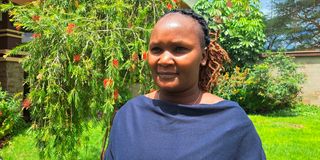Narrow escape: ‘FGM sounded exciting until I witnessed my cousin being mutilated’

Domitilah Chesang, a 34-year-old anti-FGM activist from West Pokot during an interview.
What you need to know:
- Domitilah narrowly escaped female genital mutilation during a family celebration.
- She remembers the pain she observed in her cousin's face during the procedure, making her change her perception of the practice.
From her university days to her current role as a prominent human rights activist in West Pokot County, Domitilah Chesang, 34, has been educating her community about the harmful effects of female genital mutilation and child marriage.
While she is not a survivor herself, growing up in a community where these practices were the norm inspired her to take a stand against them.
Domitilah narrowly escaped female genital mutilation (FGM) during a family celebration.
She remembers the pain she observed in her cousin's face during the procedure, making her change her perception of the practice.
She returned home without informing her family and later asked her mother what the practice was all about, but the response was unconvincing.
“As a young girl, you only imagine the attention and celebrations thereafter,” she says in an interview with Nation.Africa.
The high school teacher is now a vocal advocate against FGM and child marriage, leveraging her educational background to protect girls.
She founded the I Am Responsible (Irep), a community-based organisation that has been operational for the past nine years and uses education to eradicate harmful practices.
“Growing up as a young Pokot girl, I was prepared for it, my friends and I were even looking forward to the time we would be cut because it was all exciting.
“After I witnessed my cousin being cut, that was the turning point. I saw what actually happened during the FGM ceremony. I vowed not to allow that thing to be done to me again.”
Mentorship
Despite FGM being less discussed in schools, Domitilah realised the urgency of helping other girls and initiated mentorship programmes during her university days.
Irep operates in remote and challenging areas where FGM prevalence is higher due to inaccessibility of information, societal stigma, and cultural pressure.
According to her, FGM persists because of ignorance, lack of education, and social norms that dictate women's roles.
“We do not work around urban areas, we work in the very challenging remote and hard-to-reach areas, that is where everything happens.
“People do not have exposure to any information or activity outside their own community making it difficult to change their mindset.”
While the 2022 Kenya Demographic and Health Survey places FGM prevalence in West Pokot at 44 per cent against the national average of 15 per cent, Domitilah emphasises the need for education as a tool to change mindsets.
She believes that enrolling and retaining girls in school is crucial, along with creating awareness of the consequences of FGM.
“We have done a lot of campaigns in different areas, but what keeps hindering success is suitability on reaching everyone is a challenge.
“People do not have exposure to any information or activity outside their own community, making it difficult to change their mindset," she said.
Domitilah also highlights the importance of engaging men in the conversation, stating that they play a significant role in demanding FGM for marriage purposes.
She advocates stiffer sentences and penalties for offenders to help deter the practice.
“Men facilitate FGM to happen; they are the ones who demand FGM to happen because it's only after the cut that the man will request her hand for marriage.”
Domitilah sometimes shelters those running away from imminent mutilation.
Her overarching goal is to empower communities through education, thus creating a ripple effect that leads to the abandonment of harmful practices.
She calls on the government to prioritise education and support awareness campaigns to empower individuals to stand against these harmful practices.





